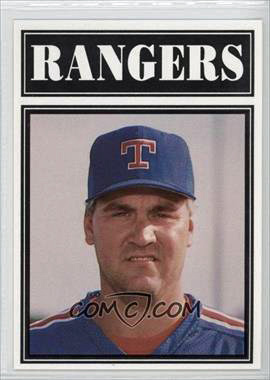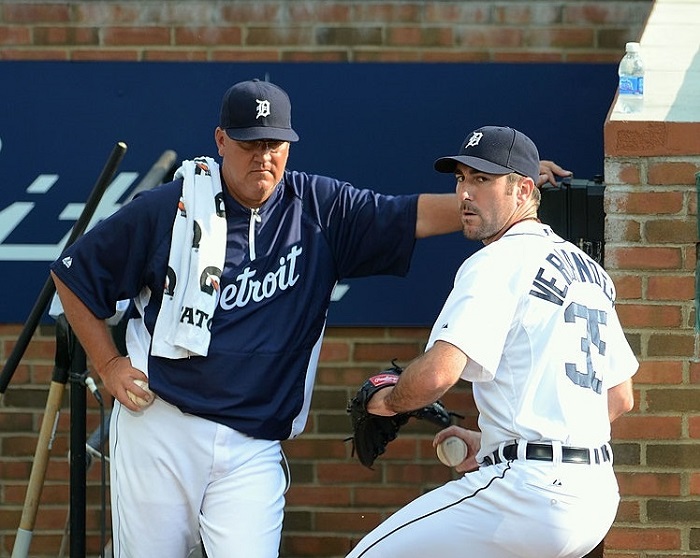Dodgers minor league pitching coordinator Rick Knapp has an interesting distinction – the 54-year-old Baltimore, Maryland native was a three-time draftee. And while this may not be a huge distinction, it is a distinction nonetheless. He was initially drafted by the New York Yankees in the 13th round of 1981 MLB January Draft-Regular Phase and then by the Milwaukee Brewers in the 3rd round of the 1981 MLB June Draft-Secondary Phase. On both occasions he was drafted out of Indian River Community College in Fort Pierce, Florida. In 1983 he was selected once again this time by the Texas Rangers in the 41st round in the June Amateur Draft out of Virginia Polytechnic Institute and State University in Blacksburg, Virginia.

Texas Rangers minor leaguer Rick Knapp
(Image courtesy of comc.com)
The right-handed Knapp had a five year career in the Texas Rangers minor league system beginning with the Gulf Coast Rangers in 1981 and concluding with the Tulsa Drillers in 1987, along with two starts with the AAA Oklahoma City 89ers. His best season was in 1985 with the Class A Salem Redbirds of the Carolina League in which he posted a 13-7 record with a 3.40 ERA.
But pitching in the major leagues was not in the cards for Knapp. No, his future in baseball would be as a pitching coach and later with an even more important role outside of the lines.
Transitioning from pitching to coaching, Knapp began his career in 1988 as the pitching coach with Single A Gastonia in the Texas Rangers organization. He followed that assignment with a four year stint as the pitching coach with the Gulf Coast League Rangers and two years as the pitching coach with Triple A Oklahoma City.
After another one year assignment with the Gulf Coast Rangers in 1995 Knapp then served as a minor league pitching coordinator with the Minnesota Twins for 12 years. In his time with the Twins, he worked with pitchers like Johan Santana, Francisco Liriano, Matt Garza, Brad Radke, Kyle Loshe, Scott Baker, Kevin Slowey, and Kenny Rogers.
In 2009 he fulfilled a life long dream and made it to major league baseball as the pitching coach for the Detroit Tigers working closely with Tigers manager Jim Leyland. Knapp recalls that on the day he was hired as a major league pitching coach he couldn’t get his grandfather Bob Gebhardt out of his mind while realizing his dream had finally come true. Gebhardt always provided encouragement for his grandson throughout 26 years in the minor leagues as a player and a coach.
“He always told me ‘You’re going to be in the major leagues some day,'” Knapp recalled.
Sadly, his grandfather died one week before he was hired as the Tigers pitching coach.
Knapp made an immediate impression on manager Jim Leyland in Detroit helping to turn the pitching staff around in his first year on the job. He is credited with transforming the Tigers’ pitching from among the worst in baseball – 27th in ERA, and 23rd in opponent’s batting average in 2008 – to one of the best. At that point Leyland declared that Rick Knapp was his guy.
”He has helped rookie Rick Porcello develop a quality curveball, streamlined Justin Verlander’s delivery and slowed reliever Bobby Seay’s delivery to provide consistency and he has been there for every pitcher whenever they need him,” said Leyland of Knapp. “He’s pretty good. He can fix guys. He’s been tremendous, just tremendous. He knows what he’s doing.”

Knapp had a huge impact on the success of several pitchers while with the Tigers, including former AL Rookie of the Year, AL Cy Young award winner and AL MVP Justin Verlander. Verlander joined Dodgers legend Don Newcombe as the only other player in MLB history to win all three awards.
(Photo credit – Mark-Cunningham)
Knapp’s pitching philosophy strips everything down to the basics: “Attacking the strike zone and cutting down on walks is all part of a pitcher trusting his stuff. Make the hitter try to hit your pitch. Don’t nibble and get behind in the count. All those thoughts and theories go hand-in-hand.”
Knapp was on hand on June 2, 2010 for the Jim Joyce call that stripped Armando Galarraga of his perfect game. He had been telling Galarraga to trust his stuff for the last two seasons and described the young hurler’s mound presence during that fateful game.
“This is the Armando Galarraga we all signed up for,” Knapp said. “He attacked the strike zone, pitched back and forth and in and out, used his sinker and wasn’t afraid to throw the ball over the plate and make them beat the ball into the ground. He put on a pitching clinic.”
The Tigers were in a state of turmoil during Knapp’s time there and, as always can be predicted, someone had to go so the team appears it is addressing its issues. It was not going to be manager Jim Leyland or team president Dave Dombrowski, so after two and one half years with the Tigers, Knapp was rather unceremoniously released. He then spent the 2012 season as the minor league pitching coordinator for the Kansas City Royals.
In 2013 Knapp was hired by the Dodgers as an assistant minor league pitching coordinator and in 2015 the “assistant” designation was removed from his title.
During 2016 spring training, Knapp spoke to the status of the Dodgers minor league pitching as seen from his perspective.
“I can’t be more excited, and not just with the pitchers in major league camp, but the state of our minor league pitching as well,” said Knapp. “It’s an exciting time to be me.”

Dodgers minor league pitching coordinator Rick Knapp looks on as Clayton Kershaw throws a bullpen session during spring training.
(Photo credit – Ron Cervenka)
Pitching phenom Julio Urias had the first rough patch in his minor league career in 2015 after a brief call up to the Oklahoma City Dodgers late in the season. Knapp did not see that as problematic or a sign of things to come except that Urias had another learning experience that most pitchers don’t encounter at age 19 and it was to his advantage.
“He got a wake-up call struggling at Triple-A last year and learned he has to pitch on the plate more,” Knapp said. “He’s always been ahead of the curve. Now, if we have any concern, it’s to build up the innings cautiously.
“It’s a balancing act,” Knapp added. “I was [major league pitching coach] with Rick Porcello when he was with the Tigers at age 20. It might mean five-inning starts. We will manage Julio accordingly.”
Knapp got a good look at all of the Dodgers minor league pitchers in spring training including Cuban youngster Yadier Alvarez, who most likely will start the season with the Ogden Raptors of the rookie level Pioneer League.
“He looked pretty good, you could see that,” said Knapp. “Fastball is live and his breaking ball’s got some nice spin, rotation, tilt, bite, whatever you want to use. His change-up isn’t really where it needs to be yet, but … there’s liveliness to his arm.”
While keeping a close eye on all of the Dodgers minor league pitchers, Knapp also most likely casts a sideways glance at the St. Luica Mets of the the Florida State League every five days. His son Ricky is presently sporting a 1.64 ERA with St. Lucia. The younger Knapp converted to pitching in 2012 while in college and was drafted by the Mets in the 13th round of the 2013 First Year Player Draft.
Rickey Knapp’s scouting report by the Mets included this reference to his Dad.
“[I] simply cannot stress enough how refined a pitcher Knapp is. His father is Rick Knapp, the former Tigers pitching coach and current Dodgers assistant minor league pitching coordinator,” the report read. “Ricky’s been learning how to pitch from a professional coach his whole life, and it shows. He has a tremendous feel for pitching, with a deep knowledge of pitch selection.”
Knapp is now wending his way around to the Dodgers minor league affiliates along with working with the youngsters and coaches still in extended spring training at Camelback Ranch. That sounds like a pretty good gig and one well suited to his in-depth knowledge and love of pitching.




 May 27th, 2016 at 8:00 am
May 27th, 2016 at 8:00 am  by Harold Uhlman
by Harold Uhlman  Posted in
Posted in 

any chance he takes over for honeycutt when his 2 yrs are up?
One would think that Rick Knapp would be an option to replace Rick Honeycutt. However the Dodgers have other in house options such as Matt Herges (AAA) and Bill Simas (AA).